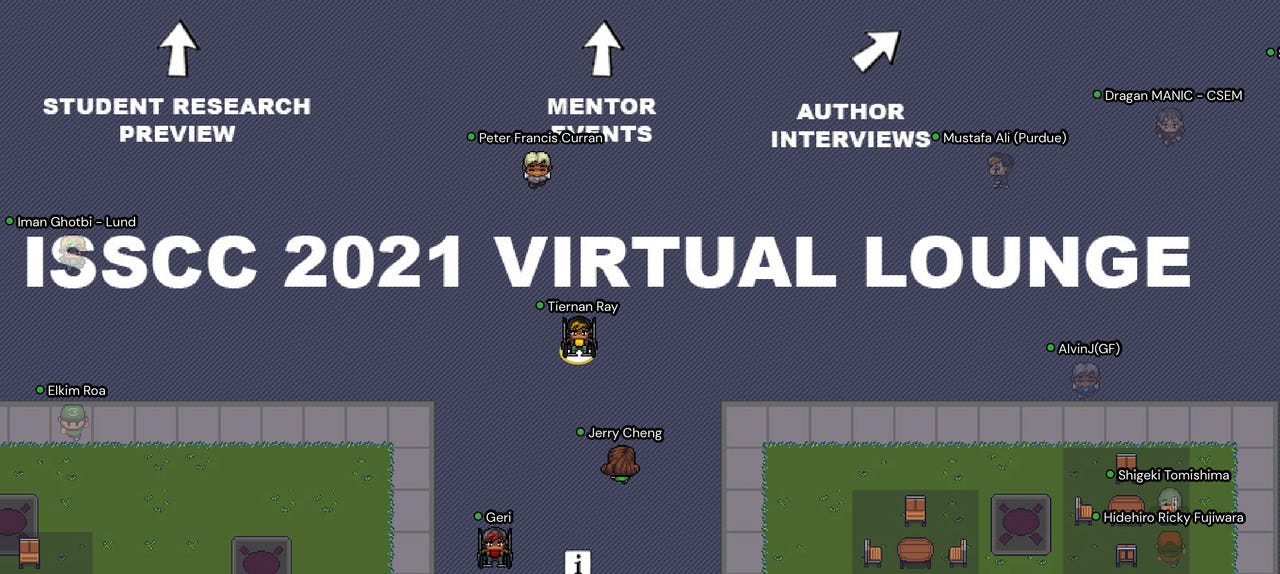Chip mavens of the ISSCC gather virtually for AI, quantum, 5G


Attendees to the 68th annual conference on chip design were able to wander through a virtual hotel ballroom in Gather.town.
Very few live events have a long history prior to the pandemic. In its 68th year, the International Solid-State Circuits Conference can claim a special place as a venerable networking function going virtual this year.
Last year, the gathering of chip designers was held just before lockdown happened in the U.S., at the Marriott Hotel in downtown San Francisco. Monday, the ISSCC kicked off in streaming fashion with guest speakers from Taiwan Semiconductor Manufacturing, the largest chip manufacturer in the world, and the Massachusetts Institute of Technology, among others.
The conference is a creation of the Solid-State Circuits Society of the Institute of Electrical and Electronics Engineers, a professional society representing over 400,00 individuals around the world that has existed in some form for 137 years.
The annual conference is a destination for top speakers in tech. Last year's keynote was given by Google Brain director Jeff Dean, and prior years have featured the likes of Facebook AI director Yann LeCun.
Monday morning's first keynote was from Mark Liu, the chairman of Taiwan Semi. Liu talked about chip-industry breakthroughs that are allowing transistors to move beyond today's smallest features, measuring 7 seven billionths of a meter, known as 7 nanometer, to 5 nanometer and 3 nanometer and beyond.
Xilinx CEO Victor Peng discussed trends in chips that can handle autonomous vehicles.
Those innovations include new materials such as hexagonal boron nitride. Another vector of progress is integrating more and more individual chips into a single system, or "chiplets," a development that goes beyond the current system-on-a-chip, or SOC.
Liu was followed by Victor Peng, chief executive of programmable chip maker Xilinx. He discussed the notion of adaptive intelligence, meaning, hundreds of billions of connected devices. That will require chips that have different kinds of computing "kernels" that can be swapped in and out, for things such as autonomous vehicles.
The keynotes, and multiple days of paper presentations — 195 accepted papers — panel discussions, and technical tutorials, offer insight into technology trends at a chip level that stretch years out into the future.
A few of the big themes this year include combining sensing with machine learning, to be discussed by MIT professor Dina Katabi in her keynote Tuesday; novel sensors for so-called light-field cameras that can change their depth of field after a picture is taken; and what are called "cryo-CMOS" chips for quantum computing.
A special session on Wednesday morning is dedicated to presentations of artificial intelligence chips from IBM, Samsung, Sony, and Harvard and Columbia universities, among others.
Conference organizers expect the event will host more people virtually this year than the in-person venue. Last year, there were a total of 2,846 attendees, and it's expected 3,000 will tune in this year.
The conference this year expanded from five days to ten to allow attendees to spread out their involvement over multiple days. Content, including things pre-recorded, and also the keynotes and other live events, were stored online to be viewed until March 31st.
The event was hosted on a browser-based platform called Underline, built by New York City-based Underline Science, which bills itself as "the world's first repository platform for cutting-edge scientific lectures, research, discussion and conference live-streaming."
The conference is also hosting author meetings at the site Gather.town, a sideways-scrolling, cartoon-style visualization where one can navigate an avatar to move through rooms that are a re-creation of the ballroom layout of the hotel setting of the conference.
Taiwan Semiconductor Manufacturing chairman Mark Liu talked about moving beyond today's system-on-a-chip to deeper integration of multiple chips into fabricated systems.